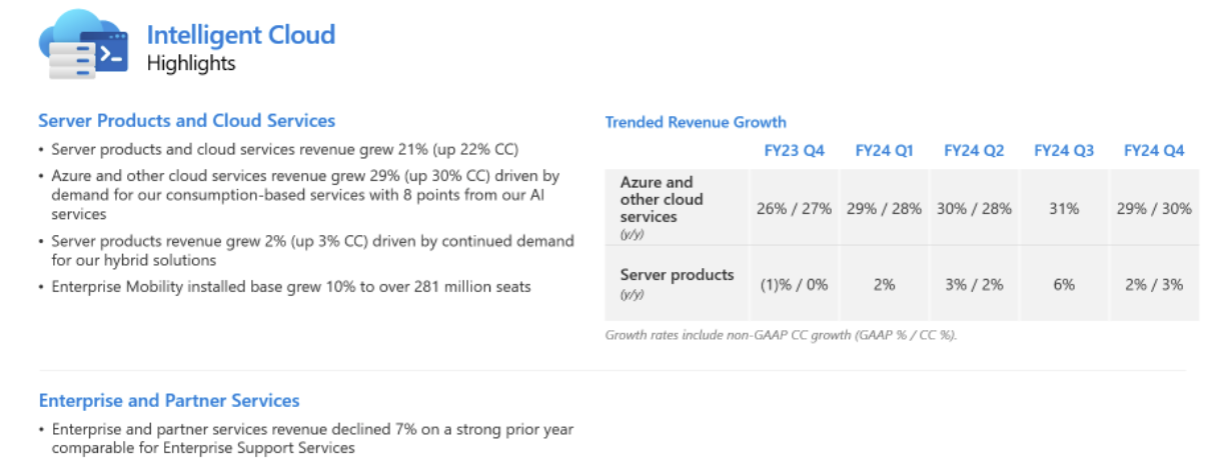Enterprise software vendors haven't been thrilled about the narrative that they aren't directly monetizing generative AI so the narrative is subtly being flipped.
With Wall Street analysts increasingly scrutinizing capital expenditures over generative AI without direct monetization, Microsoft CEO Satya Nadella and CFO Amy Hood shifted the argument a bit. Enterprise software vendors needed to bring some nuance to the genAI conversation since they haven’t benefited from it.
Instead of looking at direct genAI revenue it's worth considering the halo effect. After all, generative AI drives the usage of multiple revenue lines including Microsoft Dynamics, GitHub and various flavors of Office.
Nadella took the genAI halo effect concept for a spin on the company’s earnings call. He said: "At the end of the day, GenAI is just software. So, it is really translating into fundamentally growth on what has been our M365 SaaS offering with a newer offering that is the Copilot SaaS offering, which today is on a growth rate that's faster than any other previous generation of software we launched as a suite in M365. That's, I think, the best way to describe it."
Hood said that analysts shouldn't fret about Microsoft's fourth quarter capital expenditures of $19 billion to cover cloud and AI spending on servers, CPUs and GPUs to meet demand. Hood noted that these investments are long-term investments that benefit the Microsoft portfolio.
This post first appeared in the Constellation Insight newsletter, which features bespoke content weekly and is brought to you by Hitachi Vantara.
"Because we're building to one Azure AI stack, we don't have to have multiple infrastructure investments," said Hood. "We're making one. We're using that internally first-party, and that's what we're using with customers to build on as well as ISVs. So, it does, in fact, make margins start off better and obviously scale consistently."

Alphabet CEO Sundar Pichai served up a similar spin with a bit less nuance than Nadella had. To Pichai, genAI spending has a multiplier effect that "cuts across all our core areas our products, including Search, YouTube and other services, as well as fuels growth in cloud and supports the innovative long-term bets and other bets."
Microsoft and Alphabet are shifting the genAI spending narrative to focus on overall software sales. ServiceNow has been noting that genAI boosts sales overall. With a focus on smaller models and its NowAssist genAI offerings, ServiceNow is living the software halo walk.
ServiceNow CFO Gina Mastantuono said on the company's second quarter earnings call that genAI is contributing to net new annual contract value and fueling demand. "Our Gen AI net new ACV to date continues to trend ahead of any new product family launched for the comparable period. Our Plus SKU saw more than a 30% price uplift over Pro in Q2. Furthermore, since launch, we're seeing a greater than 3x increase in average deal size versus the comparable Pro upgrade," she said. "NowAssist cogeneration capabilities within creative workflows remain a powerful productivity tool of choice as well, appearing in over 70% of our Gen AI deals."
Why enterprise, process workflows are the new battleground
SAP also noted that its Business AI push is also leading to new deals. Rest assured you'll hear more of this genAI halo narrative going forward from Salesforce, Workday and a bevy of others. The pitch: GenAI is just software so don't go looking for direct revenue impacts.
In many ways, enterprise software vendors need to play the genAI game similar to the way Meta is. Meta CEO Mark Zuckerberg said genAI is a long game that will initially enhance existing products and improve monetization before creating new business opportunities. Of course, Zuckerberg has an advantage in that he’s not selling cloud services or software.
Insights Archive
- The generative AI buildout, overcapacity and what history tells us
- Enterprises start to harvest AI-driven exponential efficiency efforts
- GenAI may be the new UI for enterprise software
- Education tech in turmoil amid genAI: Why consolidation is next
- 14 takeaways from genAI initiatives midway through 2024
- OpenAI and Microsoft: Symbiotic or future frenemies?
- AI infrastructure is the new innovation hotbed with smartphone-like release cadence
- Don't forget the non-technical, human costs to generative AI projects
- GenAI boom eludes enterprise software...for now
- The real reason Windows AI PCs will be interesting
- Copilot, genAI agent implementations are about to get complicated
- Generative AI spending will move beyond the IT budget
- Financial services firms see genAI use cases leading to efficiency boom


